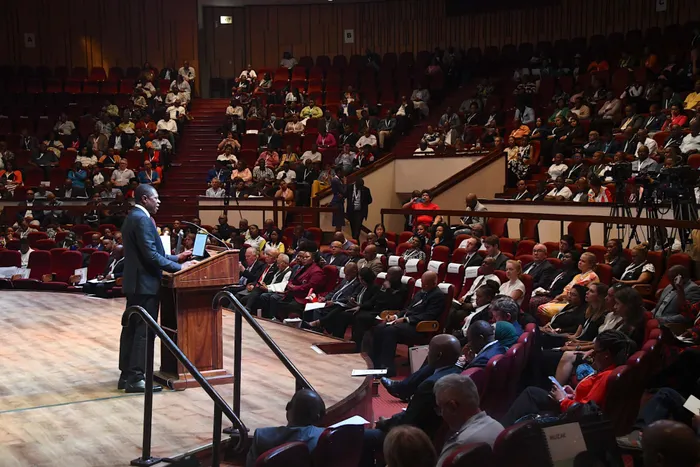Fighting graft requires robust institutions, political will, accountability

Deputy President Mashatile addressing the International Anti-Corruption Day commemoration at the University of South Africa on December 12, 2023. Picture: Siyabulela Duda/GCIS.
By Paul Kariuki
Corruption is a scourge the world over.
Countries around the world are losing billions of dollars due to corruption. Recently, the president of Uganda, Yoweri Museveni reported that corruption costs his government Uganda approximately $2.5 Billion annually.
According to the Transparency International (TI) Corruption Index, Uganda is ranked 141 out of 180 countries. This is just one example of the impact of corruption on a nation's national fiscus. Unless countries around the world are serious about stemming the rapid proliferation of this scourge in both public and corporate sectors, economic growth and development will be elusive despite progressive policies and legislation.
However, South Africa is trying to tackle corruption in all its forms through various means to further strengthen the anti-corruption framework.
The new amendment, “Section 34(A) of South Africa's Prevention and Combating of Corrupt Activities Act (PCCAA)” in April 2024, is a key part of the country's legal framework aimed at curbing corruption. This provision specifically deals with the duty to report corrupt transactions. This groundbreaking addition extends the battle against corruption into new territory, that is, private sector and state-owned entities. The anti-corruption projects that focus on enforcing this section often aim to promote accountability and transparency in both government and corporate sectors.
However, implementation of this section has not been effective due to a lack of public trust in law enforcement agencies leading to discouragement in reporting corruption cases. In addition, there are concerns that authorities do not pursue corruption cases to the grassroots, particularly when high-level officials are involved. So, then why is anti-corruption messaging not yielding the expected results?
The presence and proliferation of deep-rooted corruption networks
Corruption is deeply entrenched in various sectors, including government, state-owned enterprises, and private businesses. The powerful individuals and networks benefiting from corruption often resist meaningful reforms. These groups can undermine investigations and block accountability efforts, making it difficult for anti-corruption campaigns to gain traction.
Weak law enforcement
Although South Africa has institutions like the National Prosecuting Authority (NPA), the Special Investigating Unit (SIU), and the Directorate for Priority Crime Investigation (Hawks), they often lack the capacity, independence, or political will to effectively tackle corruption. These agencies face resource constraints, political interference, and sometimes internal corruption, which weaken their ability to enforce anti-corruption measures.
Political interference and freedom
There is often a lack of accountability at higher political levels, with senior officials and politicians perceived as being above the law. High-profile corruption cases, such as those involving former President Jacob Zuma, illustrate how politically connected individuals often avoid meaningful consequences for their actions. This impunity fosters a culture where corruption is normalized and erodes trust in the justice system.
Slow judicial processes
Even when corruption cases are brought to court, judicial processes in South Africa are often slow and cumbersome. Cases can drag on for years without resolution, which not only weakens the impact of anti-corruption messaging but also leads to public fatigue and cynicism.
Limited public education and civic engagement on corruption and its effects on society
Anti-corruption campaigns often rely on top-down approaches, focusing on legal reforms or media campaigns, but fail to engage the broader public in grassroots efforts fully. Civil society organizations play a vital role in anti-corruption movements, but without widespread civic participation, messaging alone cannot create sustained pressure for change.
What can be done differently?
To make anti-corruption messaging in South Africa yield the desired results, a multi-pronged approach is needed that tackles communication and the underlying issues of trust, enforcement, and public participation. Here are several key strategies that can improve the effectiveness of anti-corruption messaging:
Tailored Messaging to Different Audiences
Different segments of society are affected by and engage in corruption in various ways. Anti-corruption messaging should be adapted to resonate with specific groups:
- For the general public:
- For the youth and students:
- Public Officials:
- Private Sector:
In conclusion, for anti-corruption messaging to be more effective in South Africa, it needs to be backed by robust institutions, political will, and accountability mechanisms. Rebuilding public trust through consistent enforcement of the law, reducing inequality, and empowering civil society to hold leaders accountable could help shift the tide against corruption.
Also, effective implementation requires cooperation between the public sector, private sector, and civil society to build a culture of accountability and ensure that corrupt activities are reported and dealt with appropriately. Addressing these systemic issues is critical to ensure that messaging translates into meaningful results.
* Dr Paul Kariuki is the Executive Director of the Democracy Development Program and writes in his personal capacity.
** The views expressed in this article do not necessarily reflect the views of The African.
Related Topics: